JSON and XML functors
This topic describes how to use JSON and XML functors to select contents from JSON and XML sources.
These functors reduce the amount of shell scripting needed to pull JSON and XML information into your Harness Pipeline steps.
JSON Functor
The JSON functor uses the JSON library JsonPath. The JSON functor methods are described below.
select()
- Syntax:
select(string, string) - Description: Select attribute values using a path.
- Parameters: literal string, string (typically, the second string is
httpResponseBody). This is a path to identify the desired JSON attribute value from a JSON response.
Example:
Here is the JSON array that we want to select a value from:
{
"data": {
"attributes": {
"name": "new-construction-api",
"version_pins": {
"mvn-service://new-construction-api": "0.0.253-feature_NC-6595.8d268cd~nc1.6312a66"
}
}
}
}
You can find this example at https://raw.githubusercontent.com/wings-software/harness-docs/main/functors/select.json.
To select the value 0.0.253-feature_NC-6595.8d268cd~nc1.6312a66, you would use select() to specify the path to the value, like this:
<+json.select("data.attributes.version_pins.mvn-service://new-construction-api", httpResponseBody)>
The httpResponseBody argument is used to indicate that we want to select the path within the HTTP response body. httpResponseBody is propagated from the HTTP request.
A common use of select() is in an HTTP step.
For example, the following HTTP step uses a variable named book and the select() method in Value to obtain the value 0.0.253-feature_NC-6595.8d268cd~nc1.6312a66 from the HTTP response payload at the URL specified in URL.
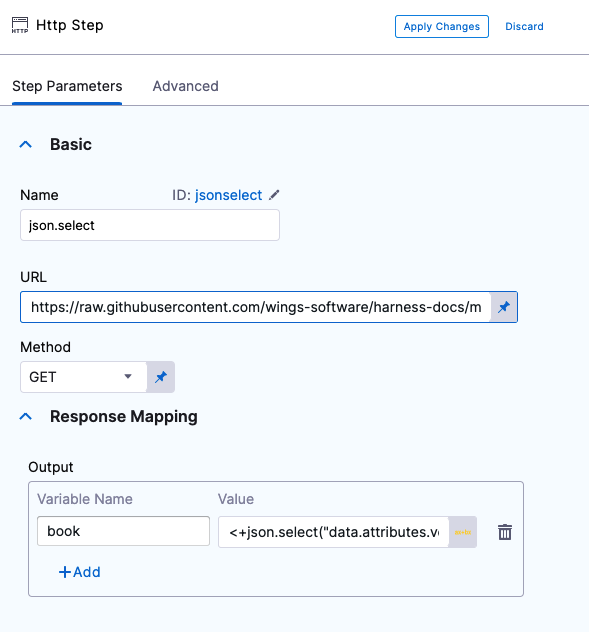
When this HTTP step is executed, in its Output tab, you can see the HTTP response in HTTP Response Body and the selection in the Output Variables:

You can also use a Shell Script step to echo the book output like this:
echo <+pipeline.stages.Functors.spec.execution.steps.jsonselect.output.outputVariables.book>
When the Pipeline is executed, the value of book is output:
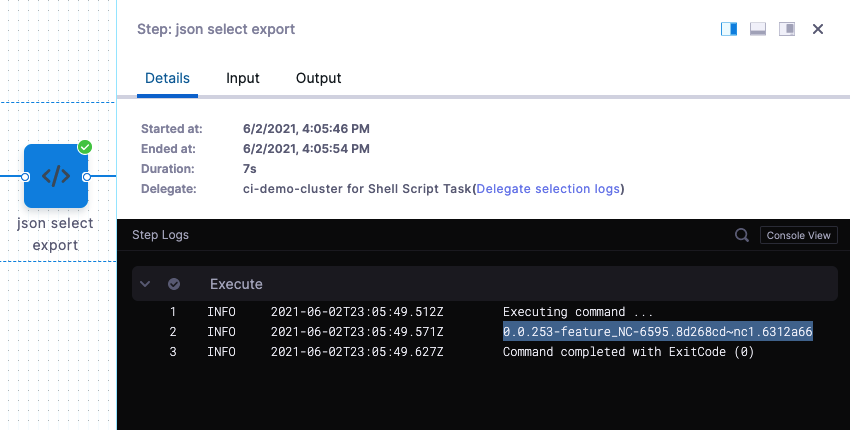
object()
- Syntax:
object(string) - Description: Selects objects from a JSON collection.
- Parameters: string. This is a JSON key used to identify the desired JSON attribute value from a JSON response. Typically,
httpResponseBody.
Example:
Here is the JSON we will query:
{"item":"value1","level1":{"level2":"value2"}}
You can find this example at https://raw.githubusercontent.com/wings-software/harness-docs/main/functors/object.json.
Here is the query using the object() method to select value1:
<+json.object(httpResponseBody).item>
We can add the object() method to an HTTP step and output it:
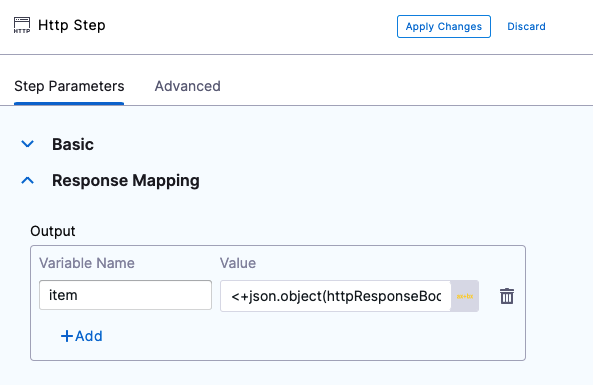
When this HTTP step is executed, in its Output tab, you can see the HTTP response in HTTP Response Body and the object in the Output Variables:
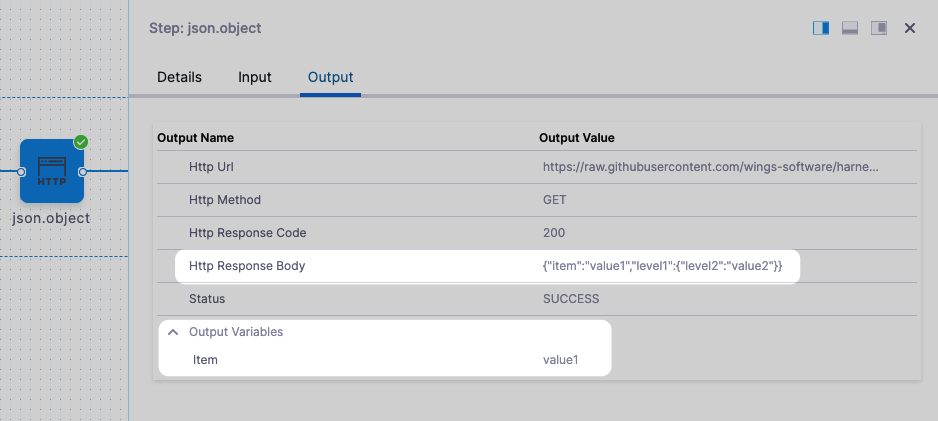
list()
- Syntax:
list(string, string) - Description: Returns list object.
- Parameters: literal string, string (typically,
httpResponseBody). Using thelist().get()method returns items from the list.
Example:
Here is the JSON we will query:
{
"books": [{
"isbn": "9781593275846",
"title": "Eloquent JavaScript, Second Edition",
"subtitle": "A Modern Introduction to Programming",
"author": "Marijn Haverbeke",
"published": "2014-12-14T00:00:00.000Z",
"publisher": "No Starch Press",
"pages": "472",
"description": "JavaScript lies at the heart of almost every modern web application, from social apps to the newest browser-based games. Though simple for beginners to pick up and play with, JavaScript is a flexible, complex language that you can use to build full-scale applications."
},
{
"isbn": "9781449331818",
"title": "Learning JavaScript Design Patterns",
"subtitle": "A JavaScript and jQuery Developer's Guide",
"author": "Addy Osmani",
"published": "2012-07-01T00:00:00.000Z",
"publisher": "O'Reilly Media",
"pages": "254",
"description": "With Learning JavaScript Design Patterns, you'll learn how to write beautiful, structured, and maintainable JavaScript by applying classical and modern design patterns to the language. If you want to keep your code efficient, more manageable, and up-to-date with the latest best practices, this book is for you."
},
{
"isbn": "9781449365035",
"title": "Speaking JavaScript",
"subtitle": "An In-Depth Guide for Programmers",
"author": "Axel Rauschmayer",
"published": "2014-02-01T00:00:00.000Z",
"publisher": "O'Reilly Media",
"pages": "460",
"description": "Like it or not, JavaScript is everywhere these days-from browser to server to mobile-and now you, too, need to learn the language or dive deeper than you have. This concise book guides you into and through JavaScript, written by a veteran programmer who once found himself in the same position."
},
{
"isbn": "9781491950296",
"title": "Programming JavaScript Applications",
"subtitle": "Robust Web Architecture with Node, HTML5, and Modern JS Libraries",
"author": "Eric Elliott",
"published": "2014-07-01T00:00:00.000Z",
"publisher": "O'Reilly Media",
"pages": "254",
"description": "Take advantage of JavaScript's power to build robust web-scale or enterprise applications that are easy to extend and maintain. By applying the design patterns outlined in this practical book, experienced JavaScript developers will learn how to write flexible and resilient code that's easier-yes, easier-to work with as your code base grows."
}
]
}
You can find this example at https://raw.githubusercontent.com/wings-software/harness-docs/main/functors/books.json.
Here is the query using the list() method to select pages from the 3rd book:
<+json.list("books", httpResponseBody).get(2).pages>
Since the JSON array starts at 0, get(2) returns pages from the third list item ("pages": "460").
We can add the list() method to an HTTP step and output it using the variable list:
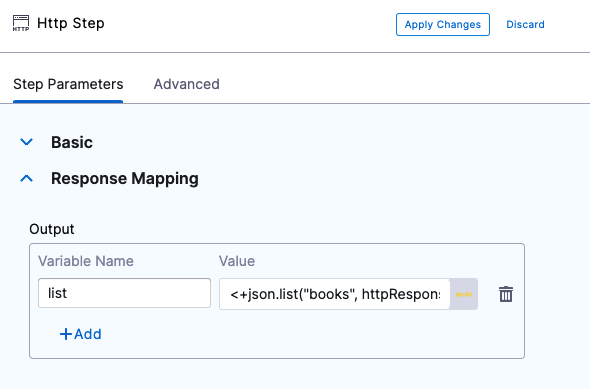
When this HTTP step is executed, in its Output tab, you can see the HTTP response in HTTP Response Body and the list item in the Output Variables:
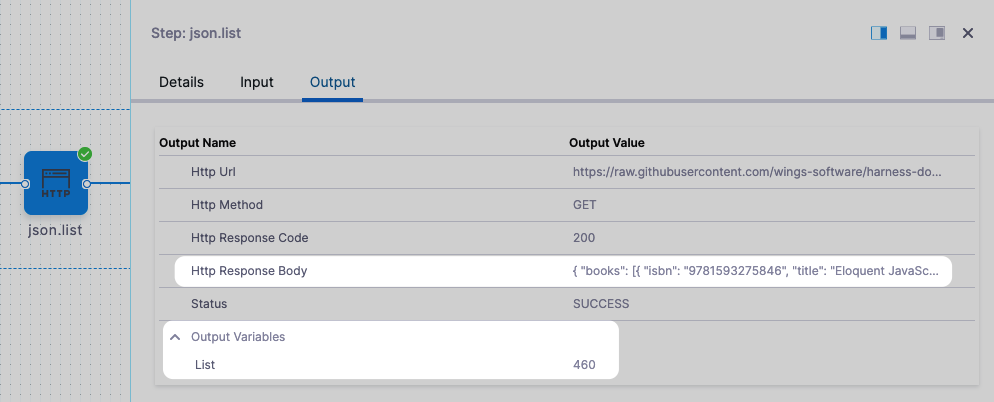
format()
- Syntax:
format(object) - Description: Format the array passed as the string value in JSON format.
- Parameters: object. Typically, this is the response from the HTTP response body (
httpResponseBody). ThehttpResponseBodyargument is used to indicate that we want to select the path within the HTTP response body.httpResponseBodyis propagated from the HTTP request.
Example:
We add an HTTP step to obtain the httpResponseBody and then reference that in a subsequent Shell Script step.
We are using the example at https://raw.githubusercontent.com/wings-software/harness-docs/main/functors/select.json.
If we simply rendered the httpResponseBody, we would get:
{data:{attributes:name:new-construction-api}} {data:{attributes:version_pins:{mvn-service://new-construction-api:0.0.253-feature_NC-6595.8d268cd~nc1.6312a66}}}
If we render it using <+json.format(<+pipeline.stages.Functors.spec.execution.steps.jsonformat1.output.httpResponseBody>)> we get a JSON formatted string:
{\n "data": {\n "attributes": {\n "name": "new-construction-api",\n "version_pins": {\n "mvn-service://new-construction-api": "0.0.253-feature_NC-6595.8d268cd~nc1.6312a66"\n }\n }\n }\n}\n
JSON accepts the control sequence
\nas strings. To format JSON, usejqto prettify the JSON.Conditional expressions within double quotes are considered strings.
So,
"<+json.select("fields.status.name", httpResponseBody)>"=="In Progress"is treated as string comparison and will not work.Use
<+json.select("fields.status.name", httpResponseBody)>=="In Progress"instead.The keyword null, too, shouldn't be enclosed in quotes during comparison.
Here's an example of a null comparison:
<+json.object(httpResponseBody).fields.parent>!=null
XML Functor
The XPath functor has one method: xml.select().
select()
- Syntax:
xml.select(string, string) - Description: Returns XML file.
- Parameters: String using an XPath expression and XML file, and a string for
httpResponseBody.
Example:
Here is the contents of the XML file we will query:
<?xml version="1.0"?>
<bookstore>
<book category="cooking">
<title lang="en">Everyday Italian</title>
<author>Giada De Laurentiis</author>
<year>2005</year>
<price>30.00</price>
</book>
<book category="children">
<title lang="en">Harry Potter</title>
<author>J K. Rowling</author>
<year>2005</year>
<price>29.99</price>
</book>
<book category="web">
<title lang="en">XQuery Kick Start</title>
<author>James McGovern</author>
<author>Per Bothner</author>
<author>Kurt Cagle</author>
<author>James Linn</author>
<author>Vaidyanathan Nagarajan</author>
<year>2003</year>
<price>49.99</price>
</book>
<book category="web" cover="paperback">
<title lang="en">Learning XML</title>
<author>Erik T. Ray</author>
<year>2003</year>
<price>39.95</price>
</book>
</bookstore>
We are using the example at https://raw.githubusercontent.com/wings-software/harness-docs/main/functors/books.xml.
Here is the query using the xml.select() method to select the title from the first book:
<+xml.select("/bookstore/book[1]/title", httpResponseBody)>
We can add the xml.select() method to an HTTP step and output it using Response Mapping:
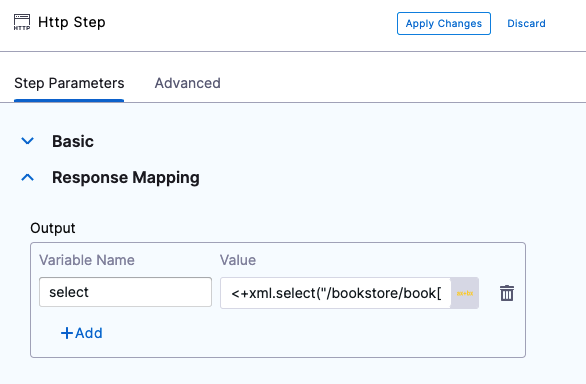
Next, we reference the output variable select in a Shell Script step:
echo <+pipeline.stages.Functors.spec.execution.steps.XML_select.output.outputVariables.select>
When the Workflow is deployed, the result is:
Executing command ...
Everyday Italian
Command completed with ExitCode (0)
You can also see the entire XML file in the deployment Details section:
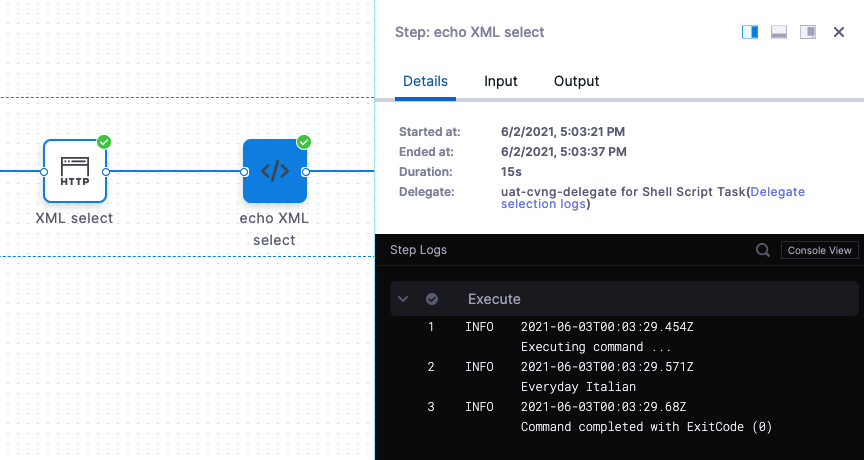
YAML Pipeline Example
Here's the YAML for a Pipeline that demonstrates all of the functors.
Functors Pipeline YAML:
pipeline:
name: Functors
identifier: Functors
projectIdentifier: CD_Quickstart
orgIdentifier: default
tags: {}
stages:
- stage:
name: Functors
identifier: Functors
description: ""
type: Deployment
spec:
serviceConfig:
serviceDefinition:
type: Kubernetes
spec:
manifestOverrideSets: []
manifests: []
artifacts:
sidecars: []
serviceRef: nginx
infrastructure:
environmentRef: quickstart
infrastructureDefinition:
type: KubernetesDirect
spec:
connectorRef: account.k8s_cluster
namespace: default
releaseName: docs
allowSimultaneousDeployments: false
infrastructureKey: ""
execution:
steps:
- step:
type: Http
name: json.select
identifier: jsonselect
timeout: 40s
spec:
url: https://raw.githubusercontent.com/wings-software/harness-docs/main/functors/select.json
method: GET
headers: []
outputVariables:
- name: book
value: <+json.select("data.attributes.version_pins.mvn-service://new-construction-api", httpResponseBody)>
type: String
- step:
type: ShellScript
name: json select export
identifier: json_select_export
timeout: 40s
spec:
shell: Bash
onDelegate: true
source:
type: Inline
spec:
script: echo <+pipeline.stages.Functors.spec.execution.steps.jsonselect.output.outputVariables.book>
environmentVariables: []
outputVariables: []
executionTarget: {}
- step:
type: Http
name: json.object
identifier: jsonobject
timeout: 40s
spec:
url: https://raw.githubusercontent.com/wings-software/harness-docs/main/functors/object.json
method: GET
headers: []
outputVariables:
- name: item
value: <+json.object(httpResponseBody).item>
type: String
- step:
type: Http
name: json.list
identifier: jsonlist
timeout: 40s
spec:
url: https://raw.githubusercontent.com/wings-software/harness-docs/main/functors/books.json
method: GET
headers: []
outputVariables:
- name: list
value: <+json.list("books", httpResponseBody).get(2).pages>
type: String
- step:
type: Http
name: jsonformat1
identifier: jsonformat1
timeout: 10s
spec:
url: https://raw.githubusercontent.com/wings-software/harness-docs/main/functors/select.json
method: GET
headers: []
outputVariables: []
- step:
type: ShellScript
name: jsonformatecho
identifier: jsonformatecho
timeout: 10m
spec:
shell: Bash
onDelegate: true
source:
type: Inline
spec:
script: echo <+json.format(<+pipeline.stages.Functors.spec.execution.steps.jsonformat1.output.httpResponseBody>)>
environmentVariables: []
outputVariables: []
executionTarget: {}
- step:
type: Http
name: XML select
identifier: XML_select
timeout: 10s
spec:
url: https://raw.githubusercontent.com/wings-software/harness-docs/main/functors/books.xml
method: GET
headers: []
outputVariables:
- name: select
value: <+xml.select("/bookstore/book[1]/title", httpResponseBody)>
type: String
- step:
type: ShellScript
name: echo XML select
identifier: echo_XML_select
timeout: 10m
spec:
shell: Bash
onDelegate: true
source:
type: Inline
spec:
script: echo <+pipeline.stages.Functors.spec.execution.steps.XML_select.output.outputVariables.select>
environmentVariables: []
outputVariables: []
executionTarget: {}
rollbackSteps: []
tags: {}
failureStrategies:
- onFailure:
errors:
- AnyOther
action:
type: StageRollback
when:
pipelineStatus: Success